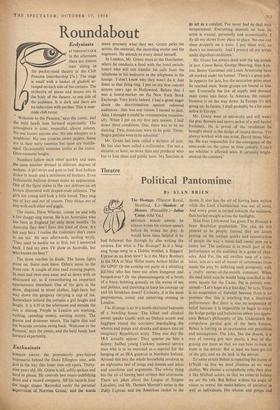Roundabout
Ecdysiasts
AT THREE O'CLOCK
'Welcome to the Panama,' says the comic, and the bald heads lean forward expectantly. The atmosphere is quiet, respectful, almost solemn. No one knows anyone else. No one whispers to a neighbour. No one crinkles sweet papers. Some are in their early twenties but most are middle- aged. Occasionally someone smiles at the comic. Once someone laughs.
Numbers follow each other quickly and seem the same number dressed in different degrees of undress. A girl strips and goes to bed. Red Indians dance in beads and a minimum of feathers. Even fashionable balloon dresses make an appearance. One of the three males in the cast delivers an art lecture illustrated with draped-nude tableaux. The girls are young and look a little bored. They sing out of key and out of unison. They dance out of step with each other and giggle.
The comic, Dave Wheeler, comes on and tells a few shaggy-dog stories. He is an Australian who has been in England for only three months. `In Australia they don't have this kind of show. It's not easy here. I realise the customers don't come to see me.' He says afterwards, smiling wryly, `They used to heckle me at first, but I answered back. I had my own TV show in Australia, but who knows me here?'
The show reaches its finale. The house lights come on. Some men leave. Others move to the front row. A couple of men read evening papers, In ones and twos men enter and sit down with an abstracted air, as if remembering an important appointment elsewhere. One of the girls in the show, disguised in street clothes, high-heels her way down the gangway carrying a cup of tea. Somewhere behind the curtains a girl laughs and laughs. It is 4.30 in the afternoon and outside the sun is shining. People in London are working, rushing, spending money, earning money. The pianist and drummer return. The lights dim and the brocade curtains swing back. 'Welcome to the Panama,' says the comic, and the bald heads lean forward expectantly.
Enthusiasts
NORMAN GRANZ, the prematurely grey-haired impresario behind the Duke Ellington tour, sells jazz in the way that lesser men sell opera. Thirty- nine years old, Mr. Granz is tall, softly spoken and hard to please. He controls two music-publishing firms and a record company. All his records bear the magic slogan 'Recorded under the personal Supervision of Norman Granz,' and the words mean precisely what they say. Granz picks the artists, the Material, the recording studio and the engineers. He attends to every detail himself.
In London, Mr. Granz stays at the Dorchester, where he conducts a feud with the hotel switch- board who will not transfer his calls from the telephone in his bedroom to the telephone in the lounge. `I don't know why they won't do it. Just listen to that thing ring. I put on my first concert sixteen years ago in Hollywood. Before that I was a board-marker on the New York Stock Exchange. Very lowly indeed. I had a great anger about the discrimination against coloured audiences: that was one reason I turned to jazz. Also, I thought it could be remunerative vocation- ally. When I put on my first jazz session, I laid down three conditions. One, there was to be no dancing. Two, musicians were to be paid. Three, Negro pations were to be admitted.'
Mr. Granz has been called a dictator of jazz. He has also been called a millionaire. 'I'm not a dictator, at least, no more than any producer who has to fuse ideas and public taste. My function is with v an ly. I can I, so rtists ople Ken- have pub- must lose nand [weft still more wears eeled -1 he `I've Mar- f the can't right- to act as a catalyst. I've never had to deal temperament. Everything depends on ho v artist is treated, personally and economical fly all my shows from place to place. No one sleep properly on a train. I pay them wel there's no insecurity. And present all my a under dignified conditions.'
Mr. Granz has always dealt with the top pe in jazz. Count Basie, George Shearing, Stan ton, Benny Goodman and Louis Armstrong all worked under his banner. 'There's a great lic appetite for jazz, but the saturation point be reached soon. Some groups are bound to out. Eventually the law of supply and den must come into force. In America, the col business is on the way down. In Europe it's going up. In future, I shall probably be a lot active in Europe.'
Mr. Granz went to university and still v the grey flannels and sports jacket of a well-hl freshman. He is proud of the revolutioi brought about in the design of record sleeves. always worked with one artist, David Stone tin.. He was responsible for the emergence o semi-nude on the cover in four colours. I say whether it affected sales. It certainly b ened up the counters.'


































 Previous page
Previous page